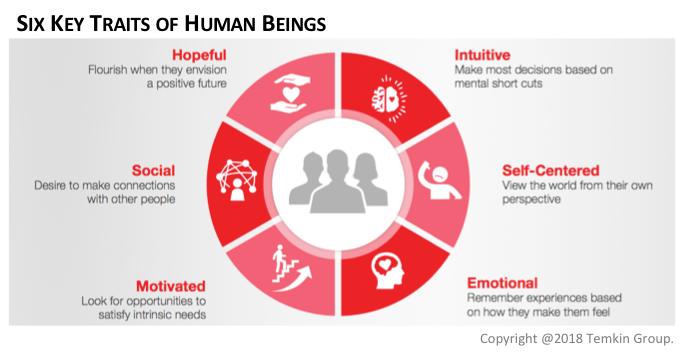Experience management is all about customers, employees, partners, suppliers, and prospects. Even an organization is just an extensive collection of people. An organization can effectively manage the experiences that deliver but first they need to understand and embrace how the people will interact and feel and think about it.
Human beings can be complicated. It is challenging to accurately anticipate people’s reactions and decisions and end-to-end design experiences that successfully result in behaviour and emotional results. Neglecting the human side of experience management can be a huge and costly mistake to the organization. Human behaviour is very unpredictable, and one cannot assume a set pattern of behaviour.
There are mainly three types of behaviour patterns:
- Cause behaviour
- Goal-oriented behaviour and
- Motivated behaviour
Understanding the past behaviour pattern is very important for developing practical human skills and a framework for predicting behaviour. Every person tends to have an experience with your organization. Experiences are referred to as an interface of how human beings take you to the world. A person’s loyalty towards a company significantly impacts their delight, frustration, reassortments, and confusion.
There are some standard sets of fundamental characteristics that every possible person shares. Understanding and catering to the needs and preferences of customers across the ecosystem is a crucial part of building long-term value for the business.
Five significant elements are managing the human experience cycle for an organization:
- Experiences: what happened with the person during an interaction with an outlet.
- Perception: the view of a person based on the experience or expectation. Perceptions are evaluated against success, effort, and emotion.
- Expectations: the anticipation of a person for what will happen during an experience with the organization.
- Attitude: sentiments and opinions people hold about the organization
- Behaviour: The interaction pattern of a person with the organization is mainly influenced by attitude
Six Key Traits of Human Beings to Learn Through Experience Management

Every human being has a trait. During the interaction of a person with an organization, there are slight differences between the preferences and requirements for experience, but some universal human qualities should be recognized and incorporated in the experience management effort formed to build Deep emotional ties with the ones interacting. The six essential traits of human beings that could help the organization to hold up with the people are:
1. Intuitive
There are two different modes of decision-making for the people. The first mode is rational thinking which can be considered slow, logical, and deliberate. At the same time, the second mode is intuitive thinking that is fast, automatic, and relies on a set of mental rules of thumb. They are based on cognitive biases. Human beings make most of their decisions using intuitive thinking, yet most organizations focus on designing experiences that appeal to people’s rational mode.
2. Emotional
People’s experiences are based on how they feel about themselves. Human memory cannot be considered a videotape because it does not record every moment of an incident or place equal emphasis on every bit of it. It could be regarded as a camera that takes snaps of certain crucial moments and then retroactively judges the experience based on it. People generally retain the most emotional extreme points and this phenomenon is known as “the “Peak End Rule.”.
3. Self-centered
People generally view the world through a personal lens because they have unique life experiences. Individual perspectives based on life experiences often separate the organization from the people designing it. In comparison to the customers, suppliers, and prospects, employees and leaders are inherently familiar with the companies’ process, structure, product, and services. The disconnect between people and the company product can exist due to the employee’s experience and the designer’s experience.
4. Social
People tend to connect with human beings that tend to be like them. They tend to trust those people’s intuitions more than other people or institutions. The experienced management team is responsible for recognizing people’s social group influence and helping in building meaningful connections among the employees, customers, and partners.
5. Motivated
Every human being strives to fulfill three intrinsic needs: progress, control, and competence. When organizations are designing experiences for the customers, employees, and partners, they need to also focus on helping people feel like they are fulfilling their intrinsic needs and not just monetary compensation or price.
6. Hopeful
Human beings tend to flourish when they have envisioned a positive future. Organizations will be more effective at motivating the employees, leaders, customers, and partners if they paint a picture of success addressing the individual needs and aspirations.
Combining an understanding of human behaviour with experience management skills and capabilities can help you identify experience gaps, cover opportunities for improvement, and make systematic changes throughout the time. Businesses that recognize the behavioural science insights to share the experience management program and nurture the culture will truly consider experience management into the core of the entire organization.
The Bottomline
Understanding human behaviour is a crucial part of a successful striving organization. It can be regarded as the softer side of experience management and an essential element for all prospects. With this program, businesses try to transform everything and create positive memories focusing on moments that matter the most and leading to high-end experiences.
The fear of discussing emotions is kept aside and they are genuinely considered to get at the core of what people genuinely want and need. This management is followed throughout the human experience cycle of understanding. Maction can help take your business to the next stage of growth. Through proven practices of market research and cutting-edge technology, we are known to bring you fresh insights and perspectives that will change the way you look at your business. Book a call today and see what a market research strategy can do for your business.


